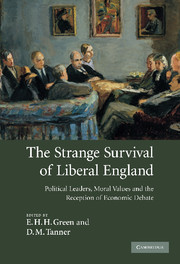 The Strange Survival of Liberal England
The Strange Survival of Liberal England Introduction
Published online by Cambridge University Press: 04 July 2009
Summary
The title of this collection – the strange survival of Liberal England – is an allusion to the title of George Dangerfield's classic polemical text, The Strange Death of Liberal England, a study which set the tone for much subsequent and more academic analysis. Dangerfield had argued that British Liberalism was effectively finished as a political creed by 1914. It had proved incapable of addressing the ‘modern’ problems which Britain faced: industrial unrest, nationalist discord, an upsurge of feminist activism – and ultimately, the irrationalism of war. Much subsequent scholarship accepted that ‘moderate’ and ‘bourgeois’ ideologies could not cope with such challenges. From this perspective, the ideas which attracted attention were naturally Marxism and fascism, the ideologies of left and right, in a century dominated by the extremes. Britain sat on the edge of these developments, the dull (but safe and rather pleasant) cousin of passionate and ideologically charged continental movements. Although British Liberalism had survived longer than its continental European equivalent, Britain's version of these developments was the polarisation of politics around a two-party, Labour–Conservative, paradigm: or so historians argued in the 1960s and 1970s.
There were powerful echoes of this emphasis within political science. Much attention was paid to sophisticated (often continental European) thinkers; the less abstractly theoretical modern British intellectual tradition was often marginalised.
- Type
- Chapter
- Information
- The Strange Survival of Liberal EnglandPolitical Leaders, Moral Values and the Reception of Economic Debate, pp. 1 - 34Publisher: Cambridge University PressPrint publication year: 2007
- 1
- Cited by


